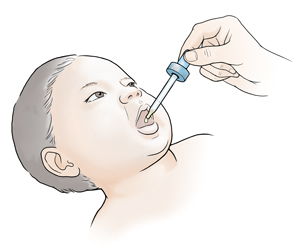Treating Sickle Cell Anemia in Children
Your child has sickle cell anemia. This is a condition passed down through genes. It affects the red blood cells (RBCs). These are the cells that carry oxygen. Your child will see a pediatric hematologist for treatment. This healthcare provider focuses on blood disorders. The goal is to help your child manage symptoms and prevent problems. This sheet tells you about treatments your child may have. Sickle cell disease can cause serious issues. Talk with your child's healthcare provider about any questions you have.
Early treatments
Most newborns are tested for blood disorders like sickle cell anemia. If diagnosed, treatment starts right away. Early treatment includes:
-
Regular healthcare provider visits. These are needed so the provider can watch your child’s symptoms and overall health. Your child will have a physical exam and routine blood tests. These are done to check for problems. These include anemia or problems with the liver, kidneys, heart, or lungs.
-
Antibiotics. These help prevent dangerous infections. Give them to your child exactly as directed.
-
Folate. This is a vitamin. It may be given to help your child build new RBCs and prevent worse anemia.
 |
| Early treatment for sickle cell anemia often includes daily doses of penicillin to help prevent infections. |
Other treatments
As your child gets older, treatments may change. Below are things that may be added to your child’s treatment plan. Each treatment has risks and benefits. The healthcare provider will discuss these with you. In severe cases, your child may need to be in the hospital.
-
Medicines. These include:
-
Hydroxyurea helps make the cells less likely to sickle. This helps prevent problems such as pain episodes or acute chest syndrome.
-
Pain relievers help manage pain. Your child may get over-the-counter pain medicines, such as acetaminophen or ibuprofen. Prescription strength medicines may be used. For severe pain, prescription pain medicines called narcotics may be used.
-
Antibiotics, such as penicillin, help fight infections and illnesses.
-
Iron chelators, such as deferasirox, help to decrease iron overload. Iron overload can happen due to repeated blood transfusions.
-
Blood transfusions. These can:
-
Increase the number of RBCs if anemia is severe
-
Help reverse a problem called acute chest syndrome, when the lungs are affected by the sickle cells
-
Reduce the risk of stroke
-
IV fluids. Replacing fluids is part of the treatment of complications.
-
Surgery. In rare cases, surgery to remove the spleen or gallbladder may be needed.
-
Stem cell transplant. Transplants can provide cures. Studies of this treatment are ongoing.
-
Gene therapies. New gene therapies have been approved to treat SCD. Talk to your child's provider about these treatments.
How to prevent complications
-
Learn and watch for signs and symptoms of illness, infection, or more serious health problems. Follow your child's healthcare provider's instructions. They will tell you when to get medical care when your child is ill or has a fever.
-
Make sure your child gets all recommended vaccines. This includes pneumococcal, meningococcal, and flu vaccines.
-
Give medicine as prescribed by the healthcare provider.
-
Make sure your child has all recommended screening exams. These include tests for hepatitis C, retinopathy, and stroke risk.
-
Have your child avoid very hot or very cold temperatures. These can affect how well blood flows through the body.
When to get medical care
Get medical care right away if your child has any of these:
-
Fever greater than 100.4°F ( 38°C ) or as directed by your provider
-
Pain that doesn’t go away with pain medicine
-
Headache
-
Trouble breathing
-
Swelling of the hands or feet
-
Weakness in 1 side of body
-
Confusion
-
Erection that won’t go away
-
Pain in chest, stomach, legs
Online Medical Reviewer:
Adam Levy MD
Online Medical Reviewer:
L Renee Watson MSN RN
Date Last Reviewed:
1/1/2022
© 2000-2024 The StayWell Company, LLC. All rights reserved. This information is not intended as a substitute for professional medical care. Always follow your healthcare professional's instructions.